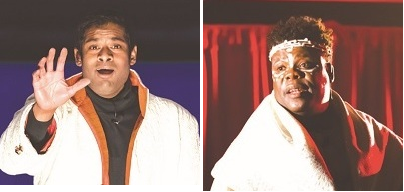In 1967, the French composer Pierre Boulez crowned his early career as a modernist provocateur by publishing an essay entitled “Blow up the Opera Houses.” Eleven years later, he conducted Patrice Chéreau’s infamous centennial version of Wagner’s Ring which had premiered at the Bayreuth Festival House in 1876. The now famous milestone of progressive Wagner stagings almost caused a riot for its brazen Regietheater style, dressing the gods as capitalists at war with the Nibelung proletariat, with Wotan costumed as a banker in a frock coat.
Twilight: Gods, created by Yuval Sharon, the Illinois-born and Los Angeles-based opera and theater director who won a MacArthur Genius Grant in 2017, does something more radical and more serious, making Boulez’s dream of detonating opera look like fancy fireworks and Chéreau’s Brechtian didactics like a school play. Sharon blows up opera and an opera into bits and pieces: not a production of Götterdämmerung but its destruction.
Twilight offers a powerful response to the explosive combination of a global pandemic and the worldwide protest against anti-Black state violence which erupted after the murder of George Floyd at the hands of a police officer on May 25, 2020. In the months that followed, audiences and venues of classical music woke up to an uncomfortable reckoning: among the arts, notated concert music and opera were seen and heard as the last bastions of white privilege. Almost overnight, symphony orchestras and opera houses found themselves having to confront their own cultural bias, issuing statements about anti-racism and struggling to respond to mounting pressures for change.
Twilight is a genuine attempt to meet this challenge. Premiered first by the Michigan Opera Theatre in Detroit in the fall of 2020, Chicago’s version followed in April. Both took place in a parking garage; and both used local BIPOC artists to connect themes of Wagner’s Germanic mythology with current concerns. In a good hour, audience members drove through half a dozen stations where star singers—including Christine Goerke (Brünnhilde), Sean Panikkar (Siegfried), and Morris Robinson (Hagen)—performed installation-like fragments of Götterdämmerung accompanied by a handful of members of the orchestra.
While the ascending levels of the Detroit parking structure created a sense of release and overcoming, Chicago’s all-underground Millennium Park Garage confined drivers to a claustrophobic labyrinth of darkness with blinding stage lights spotlighting operatic debris strewn about. As if salvaged after a cataclysmic event, the remains of Götterdämmerung—a decimated cast, scattered props, portions of the score—appeared unsure of their post-apocalyptic survival. Meanwhile, audience members, seemingly shielded from radioactive waste, watched the splintered scenes from the safety of their cars while tuning to different FM frequencies live broadcasting each scenario.
Sharon’s bizarre experiment offered a double perspective. Not unlike Quentin Tarantino’s 2012 Django Unchained, which sports Christoph Waltz’s character as a 1848-er emigree from Central Europe bounty-hunting in the rural South, Twilight puts Götterdämmerung in touch with Wagner’s revolutionary dreams of destruction—the demise of the ruling class of Gods heralded by Erda in Das Rheingold—while heeding the composer’s later change from the Ring’s optimistic Feuerbachian rebirth to a pessimistic Schopenhauerian ending: “I saw the world end.” At the same time, Twilight also destroys the pinnacle of the Ring as a paragon of cultural distinction and an epitome of racial supremacy. Although Sharon kept his directorial reins, he handed the powers of creating meaning to Black poets who took ownership over Götterdämmerung’s remains.
The outcome is perhaps most unsettling with avery r. young, a poet and performing artist from Chicago’s South Side, who not only interweaves the leftovers of Wagner’s myth into a patchwork of allusions, but also seizes the stage twice, first channeling the Norns and later delivering a eulogy for Siegfried. For a BIPOC poet, few words resonate as strongly as the word “rope.” As a result, the association between Siegfried’s mythical murder and the killing of Black Americans comes as a jolt when avery r. young speaks for the third Norn: “siegfried know(s) a river, like him know rope, like him know tree, like him know how much of dead make a bough break.”
What kind of knowledge is this? This is not just about drawing dutiful connections between a mythological past and a historical present; not a gimmick of Regietheater; and surely not a case of operatic outreach to underrepresented groups. What matters is how Siegfried’s murder— back-stabbed by a treacherous Hagen—might matter to a demographic without access to opera, let alone access to Twilight. By decolonizing the Ring, avery r. young seizes on the killing of Siegfried to draw attention to actual cases of anti-black violence and police brutality: Emmett Till, Trayvon Martin, Oscar Grant, and most recently George Floyd. Perhaps the most memorable experience of Twilight comes when spectators follow the hearse carrying Siegfried’s body through a sea of candles that illuminate the parking structure in a manner both surreal and haunting. Drivers no longer watch a processional but become part of it. This immersive act prepares them for the eulogy Siegfried never received: the riveting sermon of a Baptist preacher channeled by avery r. young mourning the death of a good friend, having watched the breath exit his body at the corner of North Avenue and Central. The message of this most intense and gripping moment of Twilight is stark and simple: in today’s America, violent death for Black citizens remains real and can never bend to aesthetic sublimation.
Not surprisingly, the vestiges of the immolation scene saved for the concluding tableau pale by comparison. As Brünnhilde rode off in a red convertible, I lowered my windows to hear Goerke’s piercing soprano drown out my radio, the unsettling acoustic interference unmasking the utterly crazy artifice of a drive-by and drive-through production. Perhaps better than Boulez imagined, Twilight succeeds at undoing opera’s vicious cycle of self-replicating cultural capital: by yielding to a Black vernacular no longer singing about others but envoicing themselves.
© Wagner Notes, June 2021, a publication of the Wagner Society of New York. All rights reserved.
